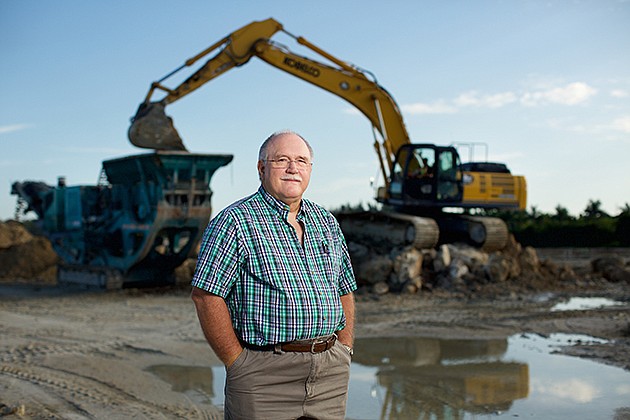- November 25, 2024
-
-
Loading

Loading

EHC Inc. didn't start out to become one of the largest earthwork and infrastructure companies in Southwest Florida, or a firm that state transportation officials would hire to complete a 32-mile expansion to Interstate 75 in Charlotte and Lee counties.
In 1990, Naples developer Grover Ericksen and Jeffrey Hunt formed Ericksen Hunt Construction to keep tabs on their construction jobs — and their general contractors.
“There was often nothing materially wrong with the work they were doing, but the truth was, we didn't know precisely what was happening on the construction sites,” says Hunt, 61, today one of four EHC owners.
That knowledge was critical because high-end residential developments, in particular, were increasingly becoming the target of litigators.
“We put systems in place where we knew everything that was happening, and as a result, we could defend ourselves if need be,” he says.
At first, Hunt and his team worked solely on Ericksen's single-family home developments, such as Lakeside in Naples. In time, the company branched out to condos on Fort Myers Beach, working for others.
“We realized it was just easier to build mid-rise condos ourselves,” says Hunt, who graduated from the University of Florida with a construction degree.
Two years after its formation, Hunt's brother, Gregory, came on board, prompting Ericksen Hunt to create a site development division.
By the mid-1990s, the Hunt brothers had bought Ericksen out, and formally renamed the company EHC.
“We grew organically,” Hunt says. “We added site development, then a prep work division a little later. We did a little of everything, except high-rise projects. But even with those, we'd do their parking and site work.”
When condo development slowed in the wake of the terror attacks of Sept. 11, 2001, EHC shifted its focus to $1 million-and-up residential building in Collier County. Thanks to Federal Emergency Management Regulations, new waterfront homes needed pilings and elevation work most general contractors couldn't handle.
Though it had always split site work and vertical building equally, EHC began focusing on utility work, excavation and drainage.
By 2008, as the longest and deepest recession in more than seven decades took hold in the U.S., EHC had little choice.
“It became abundantly clear to us that the only work that was going to occur, at least in the relative short term, was government work,” Hunt says.
So that's what EHC did. It didn't take the firm's principals long to convince themselves they could transition.
“We looked at a lot of the projects that were out for bid, and we said, 'Well, that's basically earth moving. We can do that.' We'd already been doing it,” Hunt says.
That same year, the former residential builder landed a $5.5 million project for the Southwest Florida Water Management District to rehabilitate Clam Bayou, a Pinellas County estuary.
Years of pollution and neglect had caused the bayou to slip into a morass.
For more than two years, EHC crews went to work to reclaim the bayou by restoring natural water flows, removing pollutants and eliminating the causes of flooding.
The project drew widespread accolades from nearby residents, Tampa Bay officials and SWIFTMUD. Today, the bayou is a popular fishing spot.
“They did an excellent job,” says Brandt Henningsen, a SWIFTMUD chief environmental scientist. “They were high quality and easy to work with. They really helped make the job the success that it is.”
But while Clam Bayou work gained praise, the recession still took a toll on EHC. Though the firm scratched out work doing stormwater improvements on Siesta Drive, in Sarasota, and schools in Lee County, it barely hung on. Three-quarters of its staff of 80 was let go.
“Our crystal ball was pretty cloudy in 2007 and 2008 -- we made a lot of mistakes,” Hunt says. “But we learned a lot from them, and we've evolved because of our experience and circumstances.”
While its business model changed, EHC's commitment to quality and innovation didn't.
“Our M.O. around here is we always want to find the next best way to do things,” he says. “And we're all about doing what we say we're going to do, when we say we're going to do it.
We're a proven commodity.”
The company has also invested heavily in new technology to maintain an edge. Today, EHC projects are coordinated with global-positioning satellites and lasers are used to ensure earth grades are correct.
The enhanced hardware, combined with management experience -- more than one-third of EHC's managers have been with the firm for more than a decade — have allowed EHC to emerge from the recession stronger than before.
Today, the firm employs more than 70, and regularly tackles complicated jobs like a 32-mile expansion of Interstate 75 in Charlotte and Lee counties or the paving, utility, drainage and other site work for Hertz Corp.'s new global corporate headquarters, in Estero.
Its biggest job, to date, was in 2005 for Naples developer The Ronto Group, at its Lindsford community, in Fort Myers. There, EHC performed $20 million worth of site and other work.
While Hunt refuses to divulge revenue or financial data for EHC, he notes the company has a bonding capacity of more than $20 million, larger than many similar-sized firms, a sign that it's fiscally healthy.
“We're not always the least costly company on the block, but a lot of our clients think we're the best solution on the block,” he says. “We're not the biggest earthwork company out there, either, but we're certainly big enough to tackle almost anything.”
But Hunt adds that EHC could change its focus yet again, if conditions warrant it.
“I don't know what we'd get into, but we grew from a homebuilder into a roadbuilder when we weren't planning to,” he says. “So another metamorphosis could certainly be down the road.”
- K.L. McQuaid